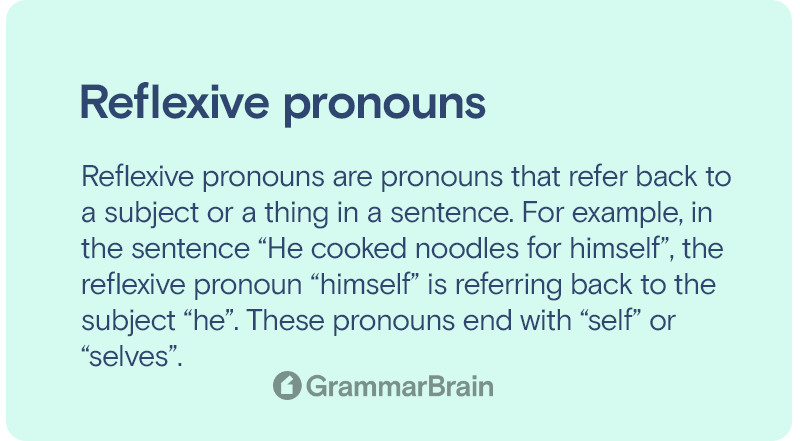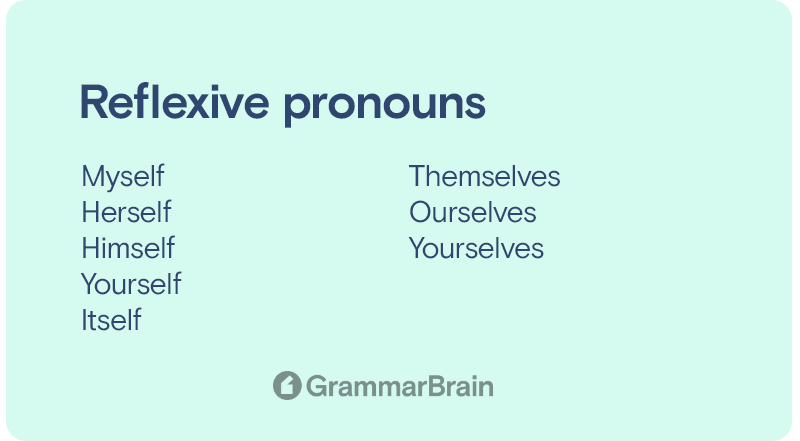What are reflexive pronouns? How do reflexive pronouns work? What words are considered reflexive pronouns in English? These are all great questions when it comes to both pronouns and understanding reflexive pronouns as a whole. Get these questions answered and more in this comprehensive guide.

What are reflexive pronouns?
Reflexive pronouns are pronouns that refer back to a subject or a thing in a sentence. For example, in the sentence “He cooked noodles for himself”, the reflexive pronoun “himself” is referring back to the subject “he”. These pronouns end with “self” or “selves”.

How many reflexive pronouns are there (examples)
There are eight reflexive pronouns in English grammar which are:
- Myself
- Herself
- Himself
- Yourself
- Itself
- Themselves
- Ourselves
- Yourselves
Here are a few examples for each one of the reflexive pronouns.
Examples:
Myself
- I gave myself a treat. Here, “myself” is a reflexive pronoun that refers back to the subject pronoun “I”.
- I washed the utensils myself.
Herself
- She made the cake herself. In this example, “herself” is the reflexive pronoun which is referring back to the subject pronoun “she”.
- She came up with the idea of painting the house with blue paint herself.
Himself
- Shawn was not able to solve a Math problem by himself so his friend helped him out. In this sentence, “himself” is the reflexive pronoun referring back to the subject “Shawn”.
- John learned Ballet himself.
Yourself
- You cut the vegetables yourself and don’t take the help of others. In this example, “yourself” is the reflexive pronoun which is referring back to the subject pronoun “you”.
- You wash the clothes yourself using the new detergent powder.
Itself
- The phone switched itself off without any external intervention. Here, “phone” is an object. As mentioned above, reflexive pronouns also refer back to an object in a sentence so the reflexive pronoun “itself” refers back to the object “phone”.
- The fan started rotating by itself because of the wind.
Themselves
- They cannot look after the dogs themselves. In this example, “themselves” is the reflexive pronoun that refers back to the subject pronoun “they”.
- They can cook the lunch themselves without help from the chef.
Ourselves
- We protect ourselves from rain by wearing raincoats. Here, “ourselves” is the reflexive pronoun that refers back to the subject pronoun “we”.
- We blame ourselves for the mess created.
Yourselves
- You can help yourselves with the snacks. In this sentence, the reflexive pronoun “yourselves” refers back to the subject pronoun “you”.
- Can you find yourselves a good hotel for the night?
Uses of reflexive pronouns
Used to refer to the same person or object in a sentence
As mentioned previously, reflexive pronouns are used to refer to the subject or object in a sentence. For example, “She treated herself by cooking delicious food”.
Here, the reflexive pronoun is referring to the subject pronoun “she”.
On the other hand, “She treated him by cooking delicious food” is a non-reflexive sentence. Here, the subject pronoun “she” is performing a certain action for someone else and not for herself.
Used for emphasis
Reflexive pronouns can be used to emphasize a subject in a sentence.
For example, “The broadband company’s senior manager himself wrote an email to us expressing his gratitude for being a regular customer”.
In this example, the reflexive pronoun is used to stress that the subject (senior manager) himself wrote the email and nobody else.
Used for politeness
Reflexive pronouns are sometimes used for politeness.
For example, “Our company is in a good position in the market because of hardworking employees like yourself”. The reflexive pronoun in this example adds respect to the whole sentence.
Reflexive pronouns with “By”
Reflexive pronouns are used with “by” in sentences to indicate someone is performing an action alone. Here are a few examples.
Examples:
- Why don’t you walk to the grocery store by yourself? In this example, the reflexive pronoun means doing the action of going to the store alone.
- They built the entire cabinet in the house by themselves. In this example, the reflexive pronoun means constructing the entire cabinet alone without help from others.
- He raised the money for constructing the swimming pool by himself.
What are the other types of pronouns?
- Object pronouns
- Possessive pronouns
- Personal pronouns
- Relative pronouns
- Direct object pronouns
- Demonstrative pronouns
- Indefinite pronouns
- Intensive pronouns
FAQs
1. What are examples of non-reflexive pronouns?
2. What is the structure of a reflexive pronoun sentence?
The structure for a reflexive pronoun sentence is “Subject pronoun + Verb + Reflexive Pronoun + Other Words”.
Here are a few examples.
- He gave himself a much-needed break.
- She blames herself for the team’s defeat.
3. What is the difference between reflexive pronouns and relative pronouns?
The relative pronoun is a pronoun that connects the independent clause in a sentence to a relative clause. Relative pronoun gives additional information about the subject. Some of the relative pronouns are “which”, “that”, and “who”.
On the other hand, the reflexive pronoun in a sentence refers back to the subject pronoun. Some of the reflexive pronouns are “herself”, “himself”, “yourself”, “ourselves”, “itself”, and a few others.
Sources
- Reflexive Pronouns | Grammar | EnglishClub
- Reflexive Pronouns
- Reflexive pronouns | LearnEnglish
- Pronouns: reflexive
Inside this article
Fact checked:
Content is rigorously reviewed by a team of qualified and experienced fact checkers. Fact checkers review articles for factual accuracy, relevance, and timeliness. Learn more.
Core lessons
Glossary
- Abstract Noun
- Accusative Case
- Anecdote
- Antonym
- Active Sentence
- Adverb
- Adjective
- Allegory
- Alliteration
- Adjective Clause
- Adjective Phrase
- Ampersand
- Anastrophe
- Adverbial Clause
- Appositive Phrase
- Clause
- Compound Adjective
- Complex Sentence
- Compound Words
- Compound Predicate
- Common Noun
- Comparative Adjective
- Comparative and Superlative
- Compound Noun
- Compound Subject
- Compound Sentence
- Copular Verb
- Collective Noun
- Colloquialism
- Conciseness
- Consonance
- Conditional
- Concrete Noun
- Conjunction
- Conjugation
- Conditional Sentence
- Comma Splice
- Correlative Conjunction
- Coordinating Conjunction
- Coordinate Adjective
- Cumulative Adjective
- Dative Case
- Determiner
- Declarative Sentence
- Declarative Statement
- Direct Object Pronoun
- Direct Object
- Diction
- Diphthong
- Dangling Modifier
- Demonstrative Pronoun
- Demonstrative Adjective
- Direct Characterization
- Definite Article
- Doublespeak
- False Dilemma Fallacy
- Future Perfect Progressive
- Future Simple
- Future Perfect Continuous
- Future Perfect
- First Conditional
- Irregular Adjective
- Irregular Verb
- Imperative Sentence
- Indefinite Article
- Intransitive Verb
- Introductory Phrase
- Indefinite Pronoun
- Indirect Characterization
- Interrogative Sentence
- Intensive Pronoun
- Inanimate Object
- Indefinite Tense
- Infinitive Phrase
- Interjection
- Intensifier
- Infinitive
- Indicative Mood
- Participle
- Parallelism
- Prepositional Phrase
- Past Simple Tense
- Past Continuous Tense
- Past Perfect Tense
- Past Progressive Tense
- Present Simple Tense
- Present Perfect Tense
- Personal Pronoun
- Personification
- Persuasive Writing
- Parallel Structure
- Phrasal Verb
- Predicate Adjective
- Predicate Nominative
- Phonetic Language
- Plural Noun
- Punctuation
- Punctuation Marks
- Preposition
- Preposition of Place
- Parts of Speech
- Possessive Adjective
- Possessive Determiner
- Possessive Case
- Possessive Noun
- Proper Adjective
- Proper Noun
- Present Participle
- Prefix
- Predicate



